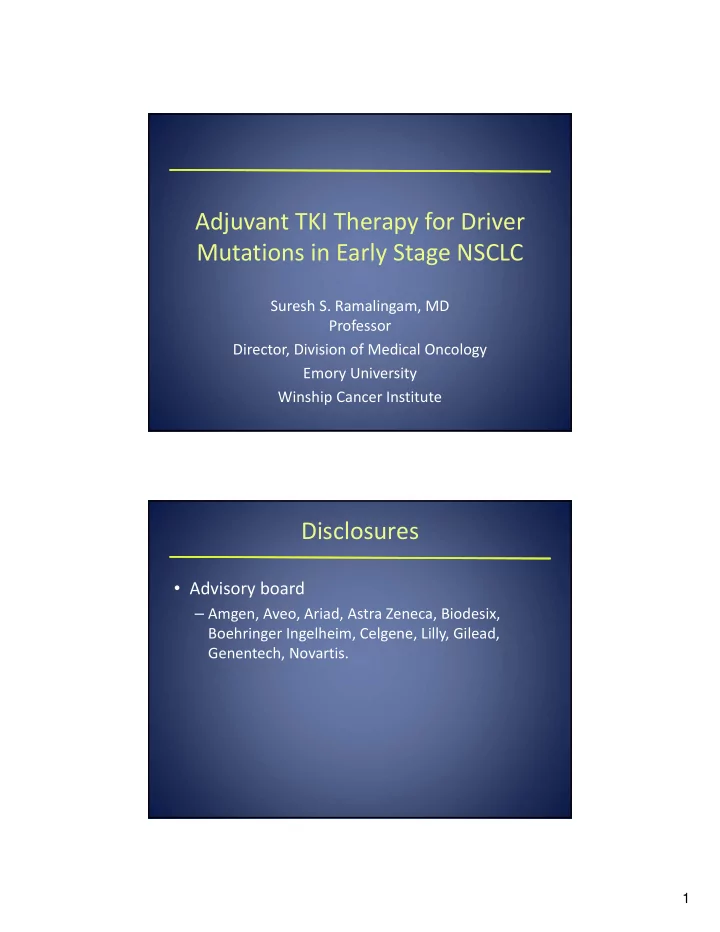

Adjuvant TKI Therapy for Driver Mutations in Early Stage NSCLC Suresh S. Ramalingam, MD Professor Director, Division of Medical Oncology Emory University Winship Cancer Institute Disclosures • Advisory board – Amgen, Aveo, Ariad, Astra Zeneca, Biodesix, Boehringer Ingelheim, Celgene, Lilly, Gilead, Genentech, Novartis. 1
Early Stage NSCLC • The goal of treatment is to cure patients • Surgery provides excellent local control • Adjuvant chemotherapy provides modest improvement in cure rate • Despite the use of adjuvant therapy, majority of patients with stage II and III NSCLC will still experience recurrent disease Chemotherapy Works Better in Early Stage NSCLC • HR for Cisplatin ‐ based chemotherapy in advanced NSCLC is 0.86 (compared to BSC) • HR for cisplatin ‐ based adjuvant chemotherapy is 0.69 – Winton et al, NEJM, 2005 • Most likely related to lower tumor burden 2
How Much Does Chemotherapy Contribute to Cure in Early Stage NSCLC? • Stage IB ‐ 3% • Stage II ‐ 10% • Stage III ‐ 13% LACE Meta ‐ analysis, Pignon et al, JCO. EGFR mut Prognostic in Resected NSCLC 1.0 0.8 Probability of OS 0.6 0.4 No EGFR mutation: Median OS = 6.3yr (95%CI: 5.6 - 7.8) EGFR mutation: Median OS = 6.9yr (95%CI: 6.3 - NA) 0.2 p (adj for stage) < 0.001 HR= 0.51 (0.34 ‐ 0.76) No EGFR mutation p < 0.001 0.0 EGFR mutation 0 1 2 3 4 5 6 7 8 Years After Surgery No. At Risk No EGFR mutation 896 778 517 293 160 104 65 26 10 EGFR mutation 222 204 133 91 55 33 18 7 4 D’Angelo, J Thorac Oncol 7(12), 2012 3
EGFR mut Predicts Benefit from Adjuvant TKI in Resected NSCLC DISEASE FREE SURVIVAL OVERALL SURVIVAL 1.0 1.0 ||| ||| | | | | || | | | |||||| ||| || | || |||| || | ||| || | || ||| | | || ||||| ||| | | |||| || || ||| |||| || || || ||| ||| ||| || ||| || ||||| ||| ||| ||| ||| | ||||| | |||| ||| || || | || || ||| | || ||| |||||| | | ||| | ||| ||| |||| |||| || | ||| | | | | |||| || | ||| || ||||| || 0.8 0.8 ||| || || || | ||| | | ||| | | || | || | | | | ||||| || | | | | | | | | | || | | | | || |||| || || || || |||||| || | | ||| | || || || ||| ||| ||||||| | | || 0.6 0.6 | || | | || | || | | | | | || | | | | || | | | | | | || | | | | | || | | 0.4 | | | || 0.4 | | | || | | | | | | | || 0.2 0.2 No TKI | No TKI no g/e, n=202 no g/e, n=202 TKI TKI g/e, n=56 g/e, n=56 adjusted HR: 0.48 (0.29, 0.80), p=0.005 Adjusted HR: 0.56 (0.27, 1.17), p=0.123 Adjusted HR: 0.48 (0.29 ‐ 0.80), p=.005 Adjusted HR: 0.56 (0.27 ‐ 1.17), p=.123 0.0 0.0 0 12 24 36 48 60 72 84 96 108 0 12 24 36 48 60 72 84 96 108 Months Months Number at Risk Number at Risk No TKI No TKI no g/e no g/e 159 159 94 94 46 46 22 22 14 14 11 11 6 6 4 1 no g/e no g/e 163 163 117 117 64 64 44 44 30 30 19 19 9 9 6 1 TKI TKI g/e g/e 74 74 58 58 39 39 18 18 8 8 2 2 0 0 0 0 g/e g/e 79 79 65 65 46 46 28 28 12 12 6 6 0 0 0 0 D’Angelo, J Thorac Oncol 7(12), 2012 Adjuvant Erlotinib at MSKCC • Stage I ‐ III NSCLC • EGFR Mutation +ve • N=167 patients • 33% received an EGFR TKI peri ‐ operatively • 2 ‐ DFS was 89% with TKI compared to 72% without TKI Janjigian et al, J Thoracic Oncol, 2011 4
Abst 7514: SELECT 5
Slide 20 RADIANT Study Erlotinib Surgery Stage IB ‐ IIIA NSCLC +/ ‐ Adj CTx Placebo Kelly et al, ASCO 2014 6
Slide 22 Presented By Karen Kelly at 2014 ASCO Annual Meeting Molecular Prognostic/Predictive Factors for Adjuvant Therapy Prognostic Predictive Prospective (Point Estimate Death) (Point Estimate Death) Validation “Occult” LN by CK IHC HR = 1.5 ? ‐‐ EGFR mutation HR = 0.5 * EGFR TKI HR = 0.5 * ‐‐ KRAS mutation ‐‐ ‐‐ ‐‐ ALK rearrangement ? in stage IV NSCLC ‐‐ ERCC1 IHC ? ? ‐‐ P27 IHC ? ? ‐‐ MSH2 IHC MSH2 high HR = 0.7 MSH2 low and cisplatin ‐‐ BAX IHC BAX high tend worse BAX high and cisplatin ‐‐ TUBB3 IHC High TUBB3 HR = 1.3 ‐‐ ‐‐ p53 ‐‐ p53+ IHC and cisplatin ‐‐ Gene sets by Affychip HR 2 ‐ 4 Canada, and Texas signature ‐‐ Gene sets by RT ‐ PCR HR 2 ‐ 4 Canada, and Texas signature ‐‐ Methylated genes HR 2 ‐ 4 ? ‐‐ 7
GIST tumors and adjuvant imatinib Recurrence free survival HR 0.35 (95% CI 0.22 ‐ 0.53), p<0.0001 No difference in overall survival Dematteo R et al. Lancet 2009; 373: 1097–104 GIST tumors and duration adjuvant imatinib Joensuu, JAMA. 2012 Mar 28;307(12):1265 ‐ 72. 8
Adjuvant Trastuzumab in Breast Cancer Gianni et al, Lancet Oncol, 2011 Conclusions • EGFR TKI as adjuvant therapy improved DFS in early stage NSCLC • Impact on survival is not known • Improved DFS has served as the basis for FDA approval of targeted agents in other diseases • The results of the the definitive randomized studies will not be available for another 8 years 9
Recommend
More recommend